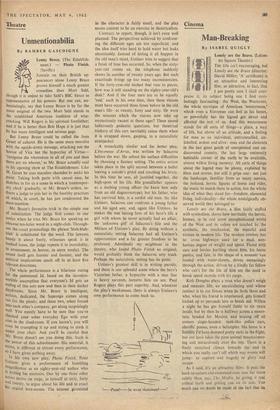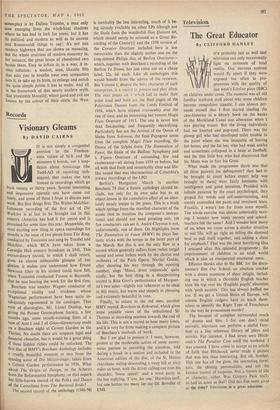Cinema
Man-Breaking
By ISABEL QUIGLY Lonely are the Brave. (Leices- g ter Square Theatre.) THE title isn't encouraging, buf Lonely are the Brave (director: David Miller; 'A' certificate) is an attractive and interesting 00 film; so attractive, in fact, that I am pretty sure I shall over- praise it, its subject being one I find ever- lastingly fascinating: the West, the Westerner, the whole mystique of American `westernness,' which even a European can feel in his bones, so powerfully has the legend got about and affected the rest of us. And this westernness stands for all sorts of things—a place, a way, of life, but above all an attitude, and a feeling for man as an individual, untrammelled, un- labelled, ardent and alive: man and the elements in the last great patch of unexploited and un- discovered country, the last large eminently habitable corner of the earth to be available, almost within living memory. All sorts of things about the legend may be phony, exploited by films and stories, but still it grips one: not just the landscape, familiar from so many movies, the isolated, heroic figures of horse and rider, the music to match them in action, but the whole idea of what they stand for—freedom, elemental living, individuality—the whole nostalgically ob- served world they belonged to.
Lonely are the Brave, a film fairly stuffed with symbolism, shows how inevitably the heroic, human, in its real sense unsophisticated world of the West and its values are crushed by the synthetic, the mechanical, the wasteful and vicious in modern life. The modern cowboy has to cross highways used for a mad, non- human degree of weight and speed. Faced with cars and lorries hurtling about him, his horse panics; and fate, in the shape of a monster van loaded with water-closets, drives menacingly through the action, driven by a kindly fat fellow who can't for the life of him see the need to break speed records with his cargo.
Kirk Douglas plays a man who doesn't weigh and measure life; an uncalculating soul whose instinct is to cut fences when he finds them and who, when his friend is imprisoned, gets himself locked up to persuade him to break out. Within a night he has got himself liable to six years inside, but by then he is halfway across a moun- tain, headed for Mexico, and beating off all corners single-handed: tank-like police cars, sheriffs' posses, even a helicopter. His horse is a liability I'd have dumped pretty early in the flight; but our hero takes the poor animal mountaineer- ing and miraculously over the top. There is a finely sustained climax towards the end in which you really can't tell which way events will jump: to capture and tragedy or glory and escape.
As I said, it's an attractive film: it puts the back-to-nature-and-elemental-man case far more subtly than, say, The Misfits, by giving it real critical teeth and getting you on its side. Too much can no doubt be made of the fact that its screenplay is by Dalton Trumbo, a man only now emerging from the witch-hunt shadows Where he has had to lurk for years; but it has As political and modern as well as its ancient and Rousseauish things to say: it's not just modern highways that are shown as menacing, but the whole craziness of modern economy in, for instance, the great heaps of abandoned cars beside them. Easy to inflate it; in a way, it in- vites inflation: a modest, sane, likeable film that asks you to breathe your own sympathies into it, to take up its hints, to enlarge and enrich the quite simple points it has to make. And all In the framework of that nearly modern myth, that irresistible Morality, where good and evil are known by the colour of their shirts, the West.







































 Previous page
Previous page